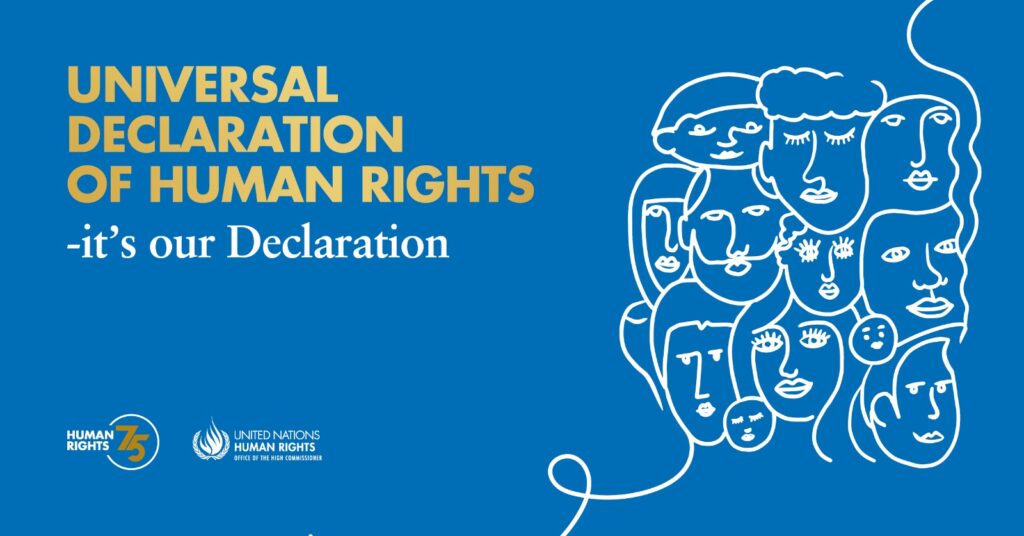The 10th of December 2023 marks the 75th anniversary of the Universal Declaration of Human Rights signed by the United Nations General Assembly in 1948. Human Rights Week is dedicated to generating awareness about the importance of human rights while acknowledging the current situation around the world. The 2023 theme, Freedom, Equality and Justice for All, is focused on challenges such as pandemics, conflicts, inequalities, poverty, racism and climate change.
This week, MOAS wants to shed light on the situation of millions of people who are forced to leave their homes in search of safety due to conflict, violence, human rights violations, persecution, natural disasters and the impact of climate change. In 2022, more than 110 million people were displaced worldwide. 52% of them from Syria, Ukraine, and Afghanistan. On the other hand, Turkey, Iran and Colombia are the countries that host the most refugees.
Not all the people involved in migration are vulnerable, but all migrants may become vulnerable to failure in respecting their human rights.
Two out of every three migrants are hosted in low- or middle-income countries and their life relies on the support offered by the authorities, local communities and humanitarian organizations. In urban areas, migrants struggle with poverty, marginalization, the lack of psychosocial support, exposure to violence and challenges in normalising their legal status. All of these can be conducive to a denial of their human rights and fundamental freedoms.
These issues increase further in the context of refugee camps where children, women and men are often forced to live in overcrowded conditions, often lacking sufficient or appropriate food, water, hygiene and health care. These communities often live under the threat of extreme climatic events and fires, the effects of which can be devastating on their humble dwellings. An unimaginable number of people risk becoming victims of criminal groups, traffickers and people smugglers, enduring sexual violence and forms of child labour.
Human rights and border protection
Migrants’ human rights are also not respected during the migration process itself. This also happens at European borders, where the displaced are often victims of pushback, intimidation, violence and humiliation. In the Mediterranean Sea, people are abandoned on life rafts. At land borders, people are even pushed back in severe weather conditions. In some instances, refugees may have been repatriated to their country of origin, despite the evident risks they will face upon return.
The situation is even more grievous in those countries where the Universal Declaration of Human Rights has never been ratified. In Libya, militias, armed groups and security forces have detained thousands of people arbitrarily. Migrants and refugees are subjected to torture, killings, sexual violence and forced labor. Many of them lose their lives while the survivors will forever carry the burden of the violence endured.
Too many fatalities have been recorded to date on migratory routes worldwide. More than 60,000 people have lost their lives in the period from 2014-2023. According to several researchers, this number represent only a fractional estimate of the losses incurred. The majority of migrants have died in the Mediterranean Sea, in the Sahara desert, on the maritime route from West Africa to the Spanish Canary Islands as well as on the borders with the Balkan countries and Turkey and in the perilous routes undertaken by the Rohingya fleeing Myanmar. The final fatal frontier is that between the United States and Mexico, other migratory routes sadly go unrecorded.
Final Thoughts
This week, we can’t close our eyes in the face of these violations of fundamental human rights. International organisations, the EU as well as each of us must do more to ensure that the rights of migrants are respected in every corner of the world according to the Universal Declaration of Human Rights. This is why we continue to invoke the #SafeAndLegalRoutes of migration and work on and improve the conditions of the most vulnerable people in the world.
If you are interested in the work of MOAS and our partners, please follow us on social media, sign up for our newsletter and share our content. You can also reach out to us at any time via [email protected]. If you want to support our operations, please give what you can at www.moas.eu/donate.

